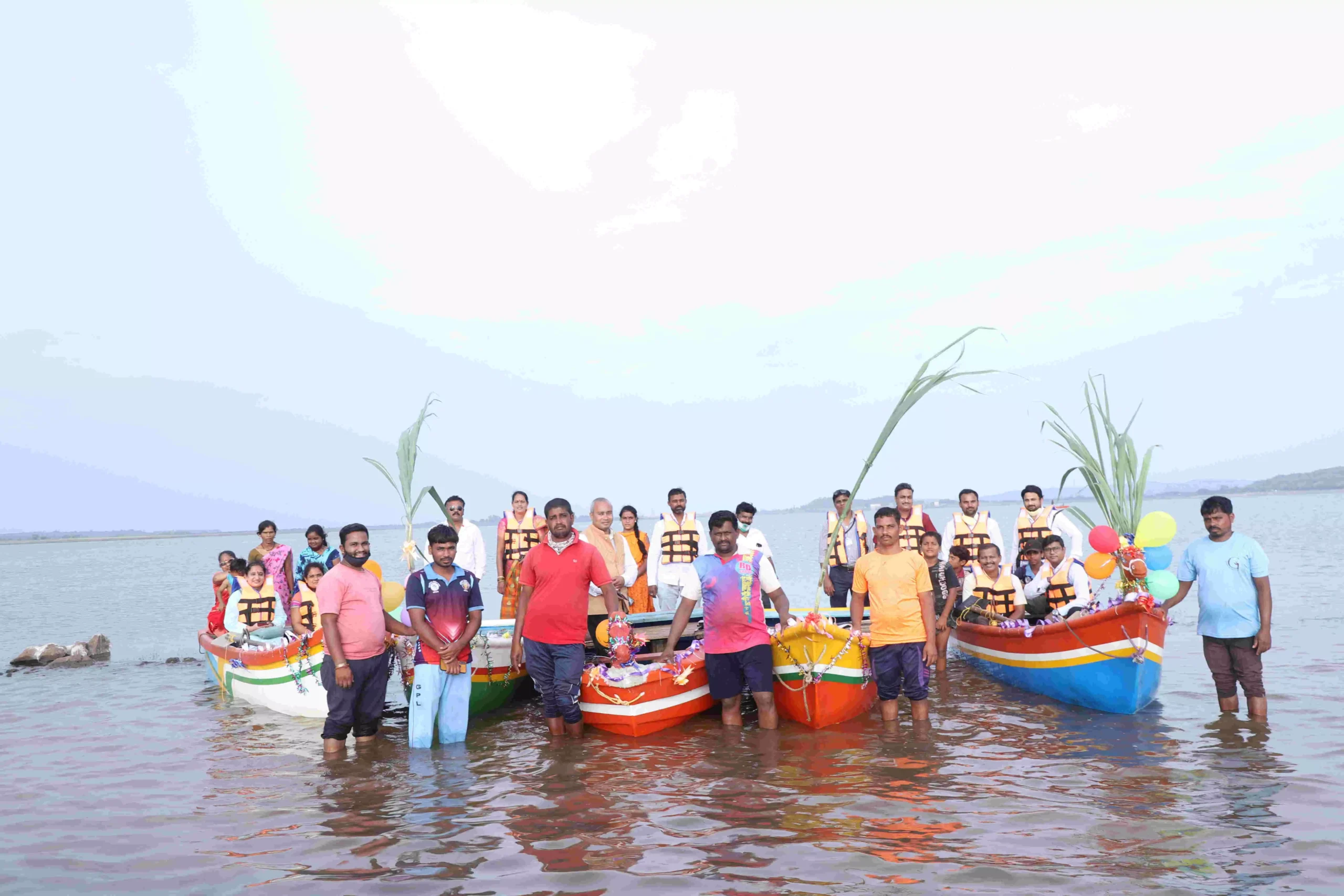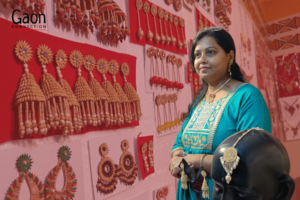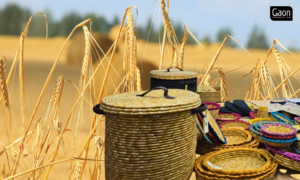Anand Mokashi had almost decided to give up his family occupation of farming. The 28-year-old farmer from Wing village was at his wits end trying to get farm labour to work on his one acre of paddy land in Satara district of Maharashtra.
“Most of the people who were traditionally farm labourers have moved away to other jobs in factories, and we had to bring a labour force from places far away,” Mokashi told Gaon Connection.
According to Mokashi, each acre of paddy land required about 30 labourers, and the cost of one-time harvesting was over Rs 8,000. This was over and above the expense of seeds that cost farmers Rs 2,400 for 40 kilogrammes (kgs) per acre.
But something happened four years ago, that changed all that, and Mokashi is now an enthusiastic farmer reaping profits from farming.
In June 2018, twelve young villagers of Wing got together and formed a self-help group called Rameshwar Reshim Udhyog. They did this to see if together they could solve the crisis facing farmers in their village.
The outcome of their discussions and deliberations led to them purchasing a rice transplanter machine. The machinery that cost Rs 2.75 lakh was given to them at a 50 per cent subsidy by the Godrej and Boyce Mfg Company.
A similar transplanting machine has changed lives in Mirje village, in Khandala tehsil of Satara. The Shri Nathsagar Farmer Group obtained the machinery two years ago. “Nearly 42 acres of land in the village have used the transplanting machine,” Ghanshyam Jadhav, a resident of Mirje told Gaon Connection.
“We earlier got about 2,000 kilos of paddy per acre, but once we started using the machine, our yield went up to 2,500 kgs an acre. Farmers are no longer dependent on other labourers to work their land. Just two members of the family can now do the job,” he pointed out.
According to Jadhav, the machine reduced harvesting costs of the farmers from Rs 12,000 to nearly Rs 5,000 per acre. The seed cost was reduced, too. From using 40 kgs of seeds per acre, the requirement came down to 12 kgs of seed per acre. In manual farming a huge portion of the seeds are wasted or washed away. Consequently, expenses decreased from Rs 2,400 per acre to Rs 700 an acre.
Most significantly, labour costs came down as now it required only two people to cultivate one acre of land in just about two hours. While farmers spent over Rs 8,000 each season per acre as labour cost, that had come down to Rs 2,000, thanks to the machine.
The procurement and use of the transplanting machines have been enabled by the corporate social responsibility of Godrej and Boyce company.
“We started focussing on integrated farming in Satara district in 2018, with the aim to strengthen and develop entire village communities,” the Mumbai-based Ashwini Deodeshmukh, Head, corporate social responsibility (CSR) & sustainability, Godrej and Boyce, told Gaon Connection.
“Various projects were started with 100 villagers, and the target is to ensure direct benefits to up to 2,200 villagers by March 2024. We are concentrating on the livelihood and agriculture sector,” Deodeshmukh said. A lot more people are also indirectly benefited by these interventions, she added.
Rice transplantation machine
The transplanting machine has proven to be a money-saving friend of the farmers and more and more of them are coming forward to use it, said Satish Panigrahi, agriculturist at the Tata Steel Foundation, East Singhbhum district, Jharkhand.
“The machine comes into use after women in the villages collect soil from their land, clean it, remove small stones from it, put it on trays and plant paddy seeds in it,” the agriculturist told Gaon Connection. “The seeds grow into seedlings in the tray after which they are placed in the rice transplanter machine, which transplants each sapling at the recommended distance. Only two people are required to run the machine,” Panigrahi explained.
“The transplanter machine increased productivity as saplings were planted at a fixed distance, ensuring each plant had enough space to grow,” Mokashi reiterated.
The paddy farmer said that the yield per acre used to be about 1,300 kgs from which they would earn Rs 50,000. But, now the yield per acre had increased to 1,800 kgs and they earned as much as Rs 75,000 by selling their produce.
The Rameshwar Reshim Udyog Group village group also earns additional income by renting out the machine to other farmers who are not part of the SHG. In all about 42 farmers are using the machine in their village. The non members have to pay for the petrol needed to run the machinery and Rs 100 an hour. According to Mokashi, the transplanting machine has been rented out to farmers to work on a cumulative 35 acres of land in the village.
Wives of the member-farmers are also earning money by doing the preliminary job of preparing saplings on their seeder and nursery trays.
“They charge Rs 30 per tray, and a farmer requires around 80 trays for an acre of land,” Swapnali Mahangare, a wife of one of the member farmers, told Gaon Connection. There are about 10 women members doing this job.
“Each woman earns around Rs 2,400 in the space of seven weeks. Other than preparing seedlings for their own plots, they also make it for other farmers and charge for it,” she added.
Also Read: Regenerative Agriculture: To benefit people, nature and climate

Fishermen with their boats at Tondal Village in Satara district of Maharastra.
Fibre boats and solar dryers for fishers
Not just farmers, Godrej and Boyce has provided advanced equipment to fisher groups too in Khandala tehsil. It has provided a 50 per cent subsidy to fishers in Khandala to purchase six boats, with each boat being used by two people. This happened after the formation of the Gosaviraj fisherman Group.
The fishing community of Tondal village in Khandala tehsil were struggling. They used risky methods to fish and were often injured in accidents or beset by diseases. And, at the end of all the hard work they could only get a catch of three to five kgs of fish a day earning them about Rs 400.
But now, they have fibre boats, better quality nets and a solar fish dryer, that has upped their income and standard of living.
“Earlier, we could not venture too far into the Veer dam waters on account of unsafe boats,” Navnath Pansare, a fisherman from Tondal village, told Gaon Connection. They would not travel more than one kilometre into the waters and often returned empty handed.
“Since June 2021 we are using fibre boats, better fishing nets and we can go up to five kilometres into the lake formed by the dam. Now, each of us is able to bring home anything between eight and fifteen kilogrammes of fish a day,” Pansare said. “Now we earn almost Rs 1,500 a day,” he added happily.

Fishermen at Tondal Village in Satara district of Maharastra.
The fishers of Tondal village not just enjoy better yields of fish, but they are also fishing with more safety equipment like life jackets. In addition, the Gosaviraj Fisherman Group also procured solar dryers which help preserve fishes for longer, which helped fishers get a better price for their catch.
The Fishermen’s Group got seven solar dryers and had to pay only Rs 10,000 for them (the remaining Rs 50,000 was borne by Godrej and Boyce). Now the fish can be preserved for up to one month, Pansare told Gaon Connection.
“Earlier, most of the small fish that we brought in went to waste as they would spoil. But now, the small dried fish are sold as poultry feed too,” Vishnu Bamane of Tondal village, told Gaon Connection. They sometimes sold the dried fish at nearly Rs 300 a kg, he added.
Kalyani Pansare, the wife of a fisherman in Tondal told Gaon Connection that they used to worry so much when the men went out to fish. “But now we know they are safe and we are also increasing the family income by drying the fish that earns us additional money,” she said.

















